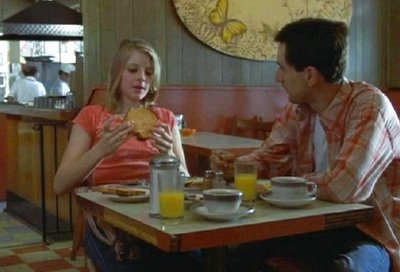
I was dutiful and didn't watch Renny Harlin's re-shoot of the Exorcist prequel, waiting instead for a chance to see Paul Schrader's original, rejected version. I'd heard some groans from those who saw Harlin's salvage mission--Renny Harlin made a dud? Come, come: This is the man who gave us Deep Blue Sea (1999), the sharks-smarter-than-us movie that has the distinction of killing off Samuel L. Jackson earlier than Janet Leigh was in Psycho, except Jackson's being swallowed had no plot impact. (I'll admit, though, it took me by surprise; fun, except when I realized we had to make it through the rest of the movie without Jackson--although LL Cool J steals what's left of the movie, which isn't much, but beggars/choosers, and so on.)
I kind of liked the fact that Schrader's movie was causing trouble. Fitting for The Exorcist, a movie I still insist is one of the great horror films, as close to expressionist/surrealist dream-logic as narrative film can get: that repetition of entering the dark room, compelled against reason, compelled by love--but buffeted by fears; still, the camera enters, and we aren't allowed to wake up, let alone look away. And Paul Schrader can be pretty compelling himself. As a writer and/or director, he has done the right thing many times: Blue Collar, Hardcore, the Cat People remake, Taxi Driver--AND Raging Bull--American Gigolo, Patty Hearst, Light Sleeper, Mishima, The Last Temptation of Christ, Affliction, Bringing Out the Dead--I like seeing them all lined up like this, difficult pictures with "God's lonely men" way out there on the frontier of self and soul. The Exorcist seemed a natural for him.
 In some ways, it is. Schrader and his writers--William Peter Blatty, still minding his little shop of horrors, William Wisher, and Caleb (The Alienist) Carr--are deeply interested in Fr. Merrin's (Stellan Skarsgard) fall from grace, and the Mark of the Devil it puts on him all his life. It starts, naturally enough, with Nazis, who force him to confront his instinct for survival as it conflicts with his duty as a priest. He sees himself as failing this test, thus becoming Satan's pet project. The film shows us his confrontation with his demons--ho, ho--and sets him up, like so many Schrader protagonists, as the only one who knows the truth, and must carry it like Atlas to keep the world aloft. This happens again and again in Schrader films, and in this prequel he gets to write the story in very large letters.
In some ways, it is. Schrader and his writers--William Peter Blatty, still minding his little shop of horrors, William Wisher, and Caleb (The Alienist) Carr--are deeply interested in Fr. Merrin's (Stellan Skarsgard) fall from grace, and the Mark of the Devil it puts on him all his life. It starts, naturally enough, with Nazis, who force him to confront his instinct for survival as it conflicts with his duty as a priest. He sees himself as failing this test, thus becoming Satan's pet project. The film shows us his confrontation with his demons--ho, ho--and sets him up, like so many Schrader protagonists, as the only one who knows the truth, and must carry it like Atlas to keep the world aloft. This happens again and again in Schrader films, and in this prequel he gets to write the story in very large letters.The result is a satisfyingly low-key movie. Even the scary stuff is more under your skin than below the belt. At the end, one of the local African holy men warns Merrin to be careful: He's made an enemy of the demon, and it will follow him all his life. Of course, he's right. Little Regan is waiting in Georgetown with her pea soup and moves so startling they'll make her own head turn. Schrader's film counts on our superimposing of the two movies; doing so, we can more easily follow Fr. Merrin as he slouches toward 1973. And the prequel helps us see he will not come to a bad end, that it makes sense he will die in the attempt to compel the Bright Liar to leave us alone. Which he never will, of course; but people like Merrin are necessary as we make our way once more to that dark, roaring room, even down those vertiginous stairs.

No comments:
Post a Comment